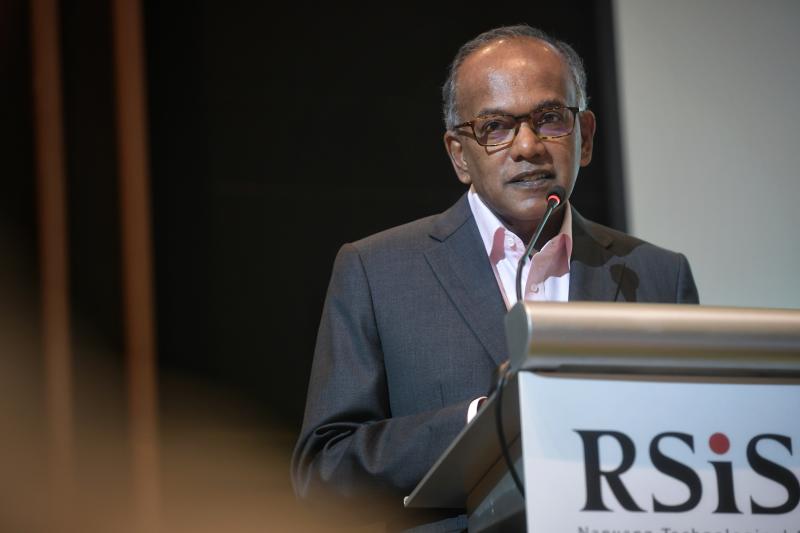Examples of foreign interference in the course of history and in Singapore
Sign up now: Get ST's newsletters delivered to your inbox

Home Affairs and Law Minister K. Shanmugam speaks at a conference on Foreign Interference Tactics and Countermeasures on Sept 25, 2019.
ST PHOTO: KUA CHEE SIONG
SINGAPORE - Active interference by one state in the affairs of another is an age-old problem that goes back centuries, said Home Affairs and Law Minister K. Shanmugam on Wednesday (Sept 25).
But now, the Internet age has allowed countries to destabilise others without the need for conventional warfare, through the use of hostile information campaigns, he added.
Mr Shanmugam, who was speaking at a conference on Foreign Interference Tactics and Countermeasures, gave several historical examples of how foreign interference has destabilised states.
CHINA'S WARRING STATES PERIOD
Led by General Yue Yi, the State of Yan conquered most of the State of Qi in 284 BC. But five years later, Yan's king died.
Tian Dan, a general from the conquered state, bribed Yan officials to spread rumours that Yue Yi wanted to become the new king.
Yue Yi was forced to flee for his life, and Tian Dan subsequently recaptured Qi's former territory.
ROME AND GREECE
Nearly 2,000 years ago, Greek politicians appealed to Roman authorities to adjudicate conflicts in a bid to destroy their domestic opponents and court favour with the rising superpower.
Years later, the Achaean League - a confederation of Greek city-states - emerged. But some Achaean politicians started lobbying Rome to prop up pro-Roman allies in Greek states. When Sparta wanted to secede from the League, these groups appealed to Rome to intervene.
Over time, Greek independence became diluted and the Greeks eventually fell to Roman rule.
SINGAPORE HERALD AND EASTERN SUN NEWSPAPERS
In the 1970s, two newspapers shut down after it was revealed that they had taken foreign funds.
The Singapore Herald pushed an anti-Government line and also published articles against national service. It took money from overseas sources, including a Malaysian politician.
The Eastern Sun was shut down after it was found to have worked with a news agency of communist China and received money from it.
In the words of then Prime Minister Lee Kuan Yew, that funding meant the paper "would not oppose the People's Republic of China on major issues and would remain neutral on minor ones".
THE HENDRICKSON AFFAIR
In the late 1980s, American diplomat Hank Hendrickson encouraged a group of Singaporean lawyers to enter opposition politics, contesting in elections against the People's Action Party.
One of them was then Law Society president Francis Seow, who was assured of refuge in the US if he ran into difficulties with the Singapore Government.
Mr Hendrickson was eventually expelled from Singapore after he was found to have meddled in domestic politics.
2016 US PRESIDENTIAL ELECTIONS
In the run-up to the 2016 United States presidential elections, a foreign troll factory conducted a disinformation campaign on various social media platforms, including Twitter and Facebook.
These companies were slow to acknowledge the problem and rectify issues. For example, it was only in late 2017 that Facebook publicly acknowledged there had been foreign interference on its platform leading up to the elections.
It estimated that between 2015 and 2017, about 126 million people received content from this troll factory and its associated accounts.
THE HUANG JING INCIDENT
In 2017, Singapore expelled an academic at the Lee Kuan Yew School of Public Policy. Dr Huang Jing was in contact with foreign intelligence groups and agents, and used his position at the school to engage prominent and influential Singaporeans.
He also tried to influence senior public officials in Singapore and change its foreign policy, as well as recruit others to help him. Dr Huang is an American citizen who was originally from China.


